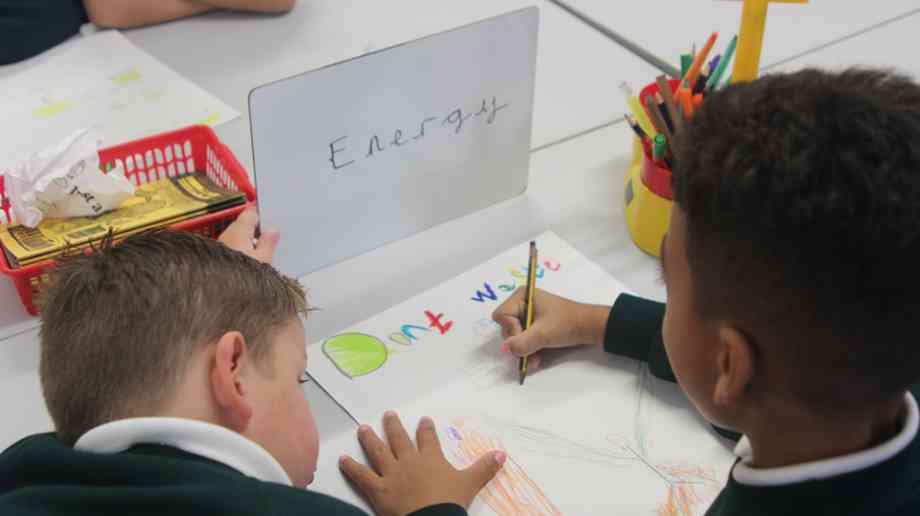
Actions to save energy, money and carbon
The Department for Education’s Sustainability and Climate Change Strategy included many positive new policies. But did it go far enough? Suzanne Gibbon, programme coordinator of the Let’s Go Zero campaign, comments on the strategy’s missed opportunities, and provides every day tips for saving energy
In April, the Department for Education launched its Sustainability and Climate Change Strategy. While this strategy included many positive new policies called for by the Let’s Go Zero campaign, it missed some big opportunities.
Let’s Go Zero is a campaign supporting all UK schools, nurseries, and colleges in their journey to becoming zero carbon by 2030. Schools sign up to show their intent and ambition to get to zero carbon and call on the government for support. With over 1,700 schools now signed up to the campaign it is proving, to government, that schools want to be part of the solution and lead the way to a zero-carbon future. Let’s Go Zero is also supported by 63 councils in the UK and growing.
The campaign has put forward many key policies, some of which were incorporated into the Department of Education strategy. These include making sure every school has a Climate Action Plan and Sustainability Lead and that sustainability and climate change were made part of the teacher training process. The strategy is a step in the right direction but does not go far enough, fast enough, given the climate emergency.
In 2022/23 Let’s Go Zero will work closely with the Department of Education to advocate for other key campaign policy asks. These include the urgent retrofit of the school estate, making buildings more energy efficient to lower emissions and fuel bills.
Energy crisis
As we move into winter, we are facing an energy crisis with sky high bills, taking funds away from important areas, such as teaching, support staff and building repairs, negatively impacting students who have already suffered two years of turmoil from Covid.
The Energy Bill Relief Scheme that was announced in September will limit the cost of energy bills that schools face and help them in the short- term. But solutions for the long-term are still needed.
The Let’s Go Zero campaign says government help needs to come in the form of increased funding for schools to carry out retrofit. This includes high grade insulation on walls, floors and roofs to stop energy leakage, and the installation of renewable energy fuel sources such as solar and wind power or heat pumps. A government focus on training the construction and heating industries on retrofit techniques and renewable heating systems is also vital.
Policy overview
There were several Let’s Go Zero recommendations included in the Department for Education’s strategy. This includes the
need to train teachers in education for sustainable development across the curriculum, and in equipping colleges and schools to give all learners a connection to nature.
It included the need for every school to have a trained staff member to take on the role of Sustainability Lead.
The recommendation that all schools will have a climate action plan was also included – but there was no promise of funding to fulfil these plans, something we urge the government to fix.
Another recommendation included was a commitment to improving DfE building specifications, so that all new school buildings, from 2022 onwards, will be net zero carbon. (It should be noted that this Lets’ Go Zero recommendation was already agreed before the publication of the strategy).
Continued lobbying
Let’s Go Zero will continue working with government to reach further goals.
This includes ensuring the government commits to all UK schools being zero carbon by 2030 and announcing long-term and consistent policies and funding to enable this.
Let’s Go Zero also calls on the government to commit to adapting and retrofitting the school estate.
By 2025, the campaign wants every school mandated to have a funded Climate Action Plan that provides step by step guidance, cutting through the current complicated procedures that will result in zero carbon status. It should be noted, that while the Department for Education has agreed to this recommendation in principle in the strategy, it has not yet agreed to it being funded. Therefore, Let’s Go Zero will continue to campaign for funded Climate Action Plans.
The Let’s Go Zero campaign will also continue to call for sustainability to be embedded as a statutory feature of careers guidance in UK schools by 2025.
The power of Let’s Go Zero’s policy work comes from sharing the views and experiences of schools, teachers and students and their link to classrooms, which is why government has worked with them in 2021/22 and will continue to do so in the future.
Energy saving advice
Here are a few energy saving tips from the Let’s Go Zero campaign:
Firstly, get every department to do a Switch Off assessment for non-usage times for lights, computers, equipment, kitchens, science labs, and so on. A 10 per cent saving on an increased energy bill is significant, it could lead to £10k plus in savings, or maybe £20-30k for a large secondary.
Get your students involved in switch off campaigns and no energy audits. Students can be a force for nature when getting things done in the school community. Have a look on Transform Our World for free lesson plans and resources.
Regarding radiators, don’t block them. Leave one metre distance around every radiator to enable air flow to heat the room, and check them for even temperature and let your facilities team know if they need bleeding.
Make sure that thermostats are set at the recommended temperature of 19 °C for classrooms. Only heat the school when everyone is there – not from when the first person arrives and the last person leaves.
Be ruthless about retaining the heat –ensure that doors and windows are closed and that you have insulated wherever possible
Monitor your energy use – is the heating being left on over the weekend or holidays?
Share information on increased energy costs to everyone in the school.
Convert the increase into what else that money could buy (for instance a staff member’s salary or being able to buy in learning support).
Explore energy efficiency and renewable support programmes – there are many ways to improve your estate with both government and private finance. Work with companies that have been recommended by another school, or through your local authority.
Lastly, don’t be afraid to ask for help. There is an enormous amount of help and guidance out there, from local authorities, environmental groups, local businesses and Let’s Go Zero.
Learning from others
Some Let’s Go Zero schools have been installing energy saving measures and encouraging energy saving behaviour.
For example, Stony Dean School in Buckinghamshire replaced all their old lighting with LED light bulbs which was financed through Salix funding. The
payback was instant with an average £300 monthly saving on energy bills. Through Salix they also manged to install 94 solar panels in April 2021 making a £2700 saving after loan repayments.
Furze Platt Senior School in Berkshire are also making savings from installed solar panels. They installed solar panels on two of their buildings by working with a local organisation, MaidEnergy, meaning there was no upfront cost for the school.
Dalmain Primary School in London, worked with their local authority and retrofit specialists Retrofit Action For Tomorrow (RAFT) on retrofitting their old school building. By repairing their roof, installing wall and roof insulation and new roof lighting they have made an energy saving of 62 per cent.
The bigger the campaign grows, the louder our voice will be. So, if you know a school that hasn’t signed up yet, tell them about Let’s Go Zero. And if you’re already supporting Let’s Go Zero, look out for opportunities to influence the policy work in 2022/23 and beyond.
Latest News
09/01/2026 - 10:13
The measure, added to the Children’s Wellbeing and Schools Bill, delivers on the commitment made in the government’s manifesto to bring multi academy trusts into the inspection system.
08/01/2026 - 10:30
The government is launching a new app allowing students to view their GCSE results on their phones for the first time from this summer.
08/01/2026 - 09:45
Education Business LIVE has announced that Professor Samantha Twiselton OBE of Sheffield Hallam University will speak at the event in March 2026, delivering two thought-provoking sessions focused on initial teacher training and SEND provision.
07/01/2026 - 10:10
Solve for Tomorrow is a free, curriculum-linked programme which is mapped to Gatsby Benchmarks 4, 5, and 6, helping teachers embed careers education without adding to workload.
06/01/2026 - 10:24
London's universal free school meals programme has not led to improvements in pupil attainment during its first year, but has eased financial pressure and reduced stress for families.







